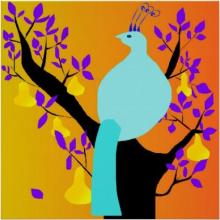
While we're in the Christmas season, here's a Christmas-themed maths problem.
The Christmas season is the 12 days from Christmas Day (25th December) until the day before Epiphany (which is 6th January, so the day before is 5th). From that 12 day period comes the song, The Twelve Days of Christmas. Many of you will know it, but for those who don't:
The Song
It is what's known as a cumulative song. Each verse recites the previous verse, and then adds one further line. The song lists the gifts given by one's true love over the Christmas period. Each day, all the gifts of the previous days are given again, and then one further one is given. The number of new items given in that day's new gift is the same as the day we are on. Thus:
On the first day of Christmas, my true love gave to me —
a partridge in a pair tree.On the second day of Christmas, my true love gave to me —
two turtle doves,
and a partridge in a pair tree.On the third day of Christmas, my true love gave to me —
three French hens,
two turtle doves,
and a partridge in a pair tree.On the fourth day of Christmas, my true love gave to me —
four calling birds,
three French hens,
two turtle doves,
and a partridge in a pair tree.On the fifth day of Christmas, my true love gave to me —
five gold rings,
four calling birds,
three French hens,
two turtle doves,
and a partridge in a pair tree.…
On the twelfth day of Christmas, my true love gave to me —
twelve drummer drumming,
eleven pipers piping,
ten lords a leaping,
nine ladies dancing,
eight maids a milking,
seven swans a swimming,
six geese a laying,
five gold rings,
four calling birds,
three French hens,
two turtle doves,
and a partridge in a pair tree.
Yes, I know that some people sing "colly birds" for day 4, instead of "calling birds".
How many gifts?
A favourite question in quizzes and trivia challenges is this: How many gifts were given in total in the song, The Twelve Days of Christmas?
So, on day 1, one gift was given.
On day 2, the number of gifts was 1 + 2 = 3.
So by the end of day 2, the total number of gifts given was 1 + 3 = 4.
On day 3, the number of gifts was 1 + 2 + 3 = 6.
So by the end of day 3, the total number of gifts given was 1 + 3 + 6 = 10.
On day 4, the number of gifts was 1 + 2 + 3 + 4 = 10.
So by the end of day 4, the total number of gifts given was 1 + 3 + 6 + 10 = 20.
On day 5, the number of gifts was 1 + 2 + 3 + 4 + 5 = 15.
So by the end of day 5, the total number of gifts given was 1 + 3 + 6 + 10 + 15 = 35.
Keep going to day 12, and the total gifts given was 364. (So, if you found this page searching on Google from under a pub table, as part of a team of 4, you can stop reading — you've found the answer you were looking for. Write the answer on the sheet, and see if you can answer the other questions without the internet.)
The Maths Problem
Here's the problem for you to solve:
Prove that, for arbitrarily large N, the total number of gifts given up to and including day N is
( N (N+1) (N+2) ) / 6
Hint: If you wish to use proof by induction, you may use this approach without proving that it is logically valid.
Note: For N=5, this amounts to 5 x 6 x 7 / 6 which is 210 / 6 or 35 - the total we found earlier.
For N = 12, this amounts to 12 x 13 x 14 / 6 which is 2184 / 6 or 364. (However this does not constitute a proof that this works for arbitrarily large N!)
God willing, I'll come back here in a week or so's time, and post a solution.
PS: To my maths teacher friend: I take it you could do this with your eyes shut. What level is this kind of question now? I think, when I was at school, it would have been roughly Lower Sixth (first half of A-level syllabus), if my memory is correct. I'm curious to know when this kind of stuff would be taught / asked now.